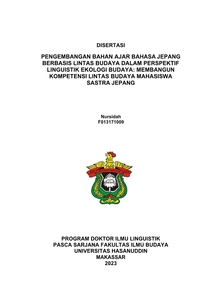Nursidah, Nursidah (2023) PENGEMBANGAN BAHAN AJAR BAHASA JEPANG BERBASIS LINTAS BUDAYA DALAM PERSPEKTIF LINGUISTIK EKOLOGI BUDAYA: MEMBANGUN KOMPETENSI LINTAS BUDAYA MAHASISWA SASTRA JEPANG. Disertasi thesis, Universitas Hasanuddin.
F013171009_disertasi_28-04-2023 bab 1-3.pdf
Download (845kB)
![[thumbnail of Cover]](/27586/2.hassmallThumbnailVersion/F013171009_disertasi_28-04-2023%20cover1.jpg)

F013171009_disertasi_28-04-2023 cover1.jpg
Download (287kB) | Preview
F013171009_disertasi_28-04-2023 dp.pdf
Download (600kB)
F013171009_disertasi_28-04-2023.pdf
Restricted to Repository staff only
Download (2MB)
Abstract (Abstrak)
Developing intercultural-based Japanese language teaching
materials in cultural, linguistic ecological perspective: Building intercultural
competence of Japanese literature students.
The study aimed at finding out the conditions of Japanese language teaching at the micro level including curriculum documents and practices that describe situational Japanese language teaching classes, perceptions
of teachers and students of Japanese literature regarding teaching materials based on intercultural communicative competence. The study of the perceptions of social actors describes the experience of teachers and students in the use of teaching materials that guide teaching and learning as a whole. Exploring changes in teaching knowledge and practice towards using intercultural-based teaching materials. 'Change' is a social product, namely the intervention of cultural-linguistic-ecological theory that underlies
the design of Japanese language teaching materials. This research was virtual action research through Collaborative Lesson Study focusing on developing, implementing, and evaluating Japanese language teaching materials in the context of higher education.
This study used a qualitative descriptive method with an autoethnographic collaborative approach with a cultural and linguistic ecological perspective. In this research, three teachers were collaborated and 40 students as participants.
The results of study indicated that the curriculum and practice of Japanese language teaching in tertiary institutions still focused on textbooks that only contain grammatical exercises and unbalanced representations of cultural dimensions, so students' intercultural communicative competence
was not achieved. However, applying intercultural communication competence-based teaching materials in the classroom affected the students’ knowledge, skills, and attitudes. Meanwhile, the teacher had an
effect on the student’s knowledge and practice of teaching Japanese in class.
| Item Type: | Thesis (Disertasi) |
|---|---|
| Uncontrolled Keywords: | Linguistic ecological, intercultural communication competence, teaching materials, collaborative lesson study. |
| Subjects: | P Language and Literature > PN Literature (General) |
| Divisions (Program Studi): | Fakultas Ilmu Budaya > Ilmu Linguistik |
| Depositing User: | Andi Milu |
| Date Deposited: | 16 Aug 2023 07:30 |
| Last Modified: | 16 Aug 2023 07:30 |
| URI: | http://repository.unhas.ac.id:443/id/eprint/27586 |


